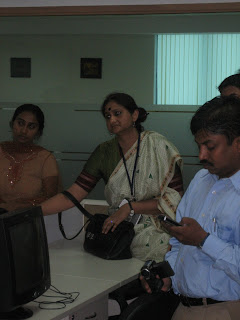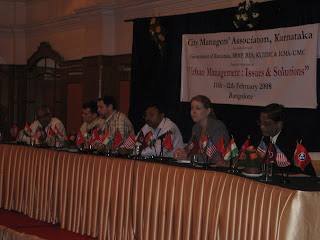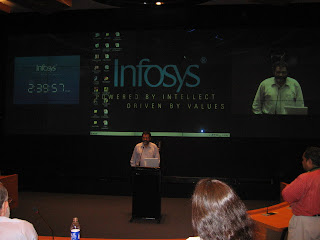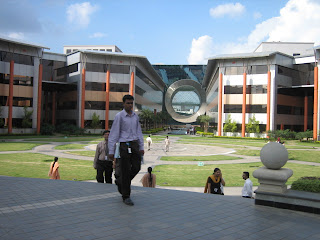Tuesday, February 12, 2008
Meetings End, Touring Begins
Priorities in Order
Shared IT Issues
 The committee took a field trip to Karnataka's joint IT center. Interesting issue here is that this center operates software that was developed by a public-private partnership called eGovernments Foundation founded by the co-chairman of Infosys. Cost savings in having experts develop needed applications for free.
The committee took a field trip to Karnataka's joint IT center. Interesting issue here is that this center operates software that was developed by a public-private partnership called eGovernments Foundation founded by the co-chairman of Infosys. Cost savings in having experts develop needed applications for free.Manvita Baradi
 Manvita is the Director of the Urban Management Center, the organization spun off from ICMA here which coordinates many of the city manager association and local government management efforts here. She coordinated two great days of meetings for us to participate in. Thanks Manvita!!
Manvita is the Director of the Urban Management Center, the organization spun off from ICMA here which coordinates many of the city manager association and local government management efforts here. She coordinated two great days of meetings for us to participate in. Thanks Manvita!!Signing Ceremony for ICMA - CMA Orissa Agreement
 ICMA President Ed Daley signs a new affiliation agreement with a representative of the City Manager's Association of Orissa. Orissa is located on the east coast of India. This agreement is the 20th such agreement worldwide between ICMA and a national or subnational city managers association.
ICMA President Ed Daley signs a new affiliation agreement with a representative of the City Manager's Association of Orissa. Orissa is located on the east coast of India. This agreement is the 20th such agreement worldwide between ICMA and a national or subnational city managers association.
ICMA Code of Ethics Discussion
 ICMA President Ed Daley, Past President Tom Lundy and ICMA International staff member Diane Crosby led a discussion on the ICMA Code of Ethics. Issues of corruption are real here at all levels of government and it has been important in the formation of the city manager associations here that the issue be discussed and strategies for addressing the problem developed. The Code of Ethics does all of this, but the concept is very foreign here. The presenters did a great job talking about the content of the Code, the importance of on-going training and the importance of having local elected officials understand the importance of their staff following an ethics code. Our Indian counterparts had many excellent insights on all of this. They observed the difficulty of getting buy in from electeds because the City Manager is appointed by the state and not the local authority, so why should the electeds care. The best observation of the day was that increasing efficiency in government would like cut down on corruption, making the introduction of a Code of Ethics that much easier.
ICMA President Ed Daley, Past President Tom Lundy and ICMA International staff member Diane Crosby led a discussion on the ICMA Code of Ethics. Issues of corruption are real here at all levels of government and it has been important in the formation of the city manager associations here that the issue be discussed and strategies for addressing the problem developed. The Code of Ethics does all of this, but the concept is very foreign here. The presenters did a great job talking about the content of the Code, the importance of on-going training and the importance of having local elected officials understand the importance of their staff following an ethics code. Our Indian counterparts had many excellent insights on all of this. They observed the difficulty of getting buy in from electeds because the City Manager is appointed by the state and not the local authority, so why should the electeds care. The best observation of the day was that increasing efficiency in government would like cut down on corruption, making the introduction of a Code of Ethics that much easier.A note about the flags on the table. The Indian and US flags are easy to recognize. The other two flags are from the State of Tennessee and the City of Alcoa, TN complements of Committee Member Bill Hammond from City of Alocoa.
Water and Sewer Systems in Bangalore
ICMA and USAID
1. Assistance with implementation of decentralization of government services from national to local governments.
2. Assistance with creation of modern financial management systems for all levels of government.
3. Assistance with creation of first municipal bonds to help finance infrastructure improvements.
4. Assistance with creation of state city manager associations and the Mega City Association.
Visit to Infosys

The Committee's last stop on Monday was a visit to the Infosys campus in Bangalore. They have built a large IT campus on the edge of Bangalore that is as modern as anywhere in the USA. We heard from an executive from the company before we received a tour of the campus. The executive made it very clear how the City of Bangalore has completed failed in its service delivery role and that is why they have had to build and equip their campus entirely by themselves with all traditional municipal services provided for their use by themselves.
Needless to say we were all a little taken aback by the comments, although I think we all understood where they were coming from. The company is one of the premier IT outsourcing companies in the world and can apparently do what they need to do here. Some among us wondered what it would have been like for Bangalore had Infosys attempted to build their complex in the midst of the problems in central Bangalore and could their large investment had a greater impact in fixing the issues the Infosys executive was now railing against.
Monday, February 11, 2008
So How Do You Become an Indian Cty Manager?
And who said city management wasn't rocket science???
Challenges Faced by Indian Cities
The national government is only now beginning to give money to cities for infrastructure.
Another major challenge for cities is that they are not responsible for land use decisions. These are made by the state government. Police and fire also provided by other levels of government.
It was clear hearing from the city managers that political pressure is huge for change since the impact of these issues is crushing these communities. There is talk of having strong Mayor form of government replace city managers. All of these are old cities (Ahmedabad was founded in 1411) and have survived a long time. The rush of change here and the explosive growth of cities has severely chalenged the ability of cities to provide municipal services here. We will hear more about all of this tomorrow.
Meetings with Indian City Managers


Sunday, February 10, 2008
Sunday Committee Meeting
The second part of today's meetings was to discuss revisions to our current committee workplan. The biggest change that we agreed to was to begin developing a specific policy document to recommend to the ICMA Executive Board on how ICMA should pursue future international efforts that are funded by sources other than traditional foreign aid funding sources.
The committee decided to meet in Europe for its Winter/Spring 2009 meeting in order to encourage involvement from our European affiliates at the meeting. The next regular meeting of the committee will be in Richmond, VA this Fall as part of the ICMA Annual Conference.
Saturday, February 9, 2008
Life in Bangalore
Saturday Committee Meeting
 The committee began its meeting on Saturday morning at the Taj Gateway Hotel, our base of operations for our stay in Bangalore. Everyone else had arrived Friday or earlier in Bangalore, so they were not suffering from the jetlag that I was trying to fight. Two sets of lost luggage, but otherwise everyone arrived safely.
The committee began its meeting on Saturday morning at the Taj Gateway Hotel, our base of operations for our stay in Bangalore. Everyone else had arrived Friday or earlier in Bangalore, so they were not suffering from the jetlag that I was trying to fight. Two sets of lost luggage, but otherwise everyone arrived safely.Our meetings here Saturday and Sunday are based primarily on ICMA association issues. We spent Saturday reviewing progress on our workplan for the year. (PDF) A big discussion took place regarding where ICMA should be headed in our work outside the United States in cases where the work is not being funded by outside foreign assistance agencies like USAID. Committee members also expressed frustration that we are not getting the word out to ICMA members about the benefits of the association's work outside the US. We will likely talk more about this on Sunday.
Currently, much of ICMA International's work is being done with projects in Afghanistan, Iraq, Guatemala, Indonesia, Serbia, India, Ethiopia and Lebanon which are funded by grants from outside foreign assistance agencies. ICMA funded international programs focus on those offered through ICMA South Asia and ICMA Latinoamerica.
Travel To Bangalore
Wednesday, February 6, 2008
Friday, February 1, 2008
What Does the International Committee Do?
The committee is charged with responsibilities each year by the ICMA Executive Board. The current committee charge (PDF) was approved by the Executive Board last June.



